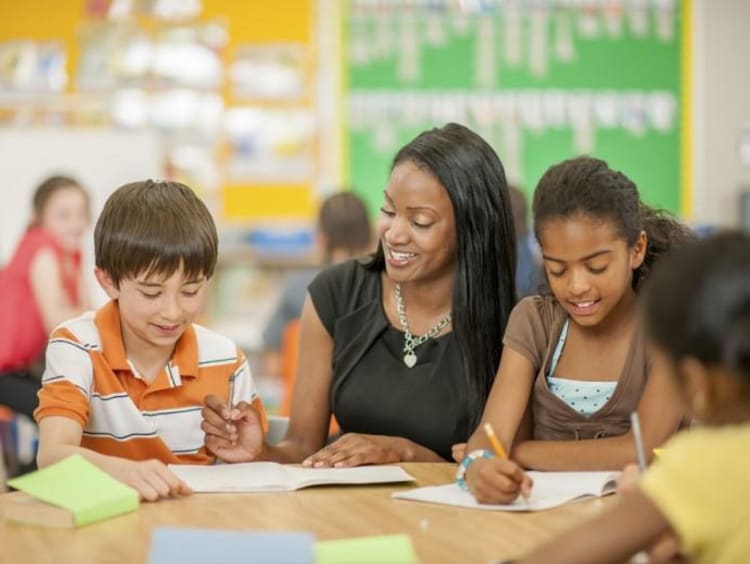4 Qualities of a Good Teacher

Those who choose to teach often have a passion to make a difference in their world and impact the future. Teachers have the power to influence and guide students, and good teachers are those who embrace the qualities of effective teaching so their students can become productive and contributing members of society. Education degrees are available in areas like elementary education, early childhood education, special education and many more, to prepare you for a successful career in education.
When considering the qualities of a good teacher, it is helpful to also keep in mind what makes teachers effective. These are a few such qualities:
Great Communicator
When a teacher is able to convey ideas in ways that are creative, meaningful and comprehensible, students are more likely to be motivated to learn more. That in turn increases the chances they will read and improve their literacy skills.
Within communication, using technology tools in the classroom can help students be more engaged and innovative with one another. Using this kind of teaching for students can also build responsibility through skillful habits to help them be more on task. However, when using technology, it is important to prevent students from becoming distracted and to keep everyone on task and on schedule with their assignments.
Fair and Respectful
Fair teachers treat their students as individuals with unique emotional and academic needs. They differentiate their instruction accordingly and they honor and celebrate their students’ unique cultural backgrounds and perspectives.
If a student is struggling within the classroom, whether socially or academically, a teacher needs to recognize the problem and do everything they can to help. It is important to treat students equally and show them respect and proper attention. By doing so, you remind each student that they matter.
Develops Relationships with Students
Building strong and respectful relationships with your students can create trust, and can also encourage students to listen more and be engaged within the classroom. Teaching the students to be kind and respectful to other classmates can foster a more courteous and professional environment. Patience and caring are two important factors in developing relationships with your students.
Uses Real-World Examples Within Learning
Implementing examples from real-world living is important for students to learn, even at younger age levels. As they learn about essential life skills that require common sense and street-smart thinking, they can then apply that knowledge inside and outside the classroom as their education grows.
Attention to real-world situations can be embedded in daily lesson plans and homework assignments to help the process start as early as possible. As these students grow up, they can learn how to handle difficult situations, not just in education but in their daily lives as well.
Knows How to Discipline
Learning to set professional and healthy boundaries with your students is essential to success as an educator. Using strong and effective discipline skills can promote positive behavioral actions within the classroom. If a student is disrespectful to a teacher, they must be made to recognize their misbehaviors and understand how to apologize respectfully.
Students must also understand that respecting their elders is important both within the classroom and in the future as they go on in life. It is part of every teacher’s job to implement respectful discipline for students when necessary.
Stays Balanced and Organized
Teachers need to know how to balance their life inside and outside teaching. If you spend too much time on your professional life, it will take up all of your time and you will not find enough rest for yourself. The same goes for not having enough planned time within your teaching, which may cause your professionalism to suffer. Being organized within your work is always important because it helps you be the best educator you can be.
Communicates High Expectations
Effective teachers communicate their high expectations to their students by explaining lessons in a clear and concise manner. They encourage dialogue and critical thinking by practicing questioning techniques and they provide constructive, immediate and continuous feedback on their students’ assignments.
Expecting greatness from students is valuable because it challenges them to be better—which is the essence of education. Knowing how to challenge students makes them stronger within their education, social skills and responsibilities. Outlining the important objectives of lesson plans for students helps them be successful in their studies.
Makes Decisions Based on Data
Effective teachers use data from their students’ learning to inform the planning and delivery of their lessons. They also refer to the data to help them design appropriate learning experiences as well as authentic assessments to measure students’ learning.
A bachelor in education may be right for anyone with the drive to be a role model for youth today. Learn more about Grand Canyon University’s College of Education and the variety of education degrees offered.
The views and opinions expressed in this article are those of the author’s and do not necessarily reflect the official policy or position of Grand Canyon University. Any sources cited were accurate as of the publish date.


